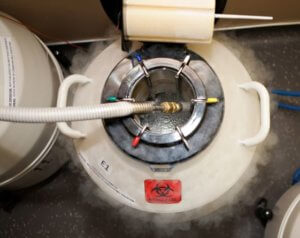 In vitro fertilization and the ability to cryopreserve embryos has led to some sticky legal situations where state law has yet to set a lasting precedent. Many couples who split up after IVF are often faced with the question “whose embryos are they” if they also have embryos frozen. Recent headlines attest to these increasing legal conundrums:
In vitro fertilization and the ability to cryopreserve embryos has led to some sticky legal situations where state law has yet to set a lasting precedent. Many couples who split up after IVF are often faced with the question “whose embryos are they” if they also have embryos frozen. Recent headlines attest to these increasing legal conundrums:
- “Sophia Vergara Sued by Ex-fiancé Over Frozen Embryos”
- “Landmark Frozen Embryo Custody Case: Illinois Court Sides with Woman; Ex-Boyfriend Calls It Forced Procreation”
- “Divorced Washington Couple Disputes Fate of Frozen Embryos Created Using Donor Eggs”
- “Michigan Couple Fights Over Frozen Embryos During Divorce”
- “Texas Man Sues for Right to Choose Not to Procreate Following Dispute Over Frozen Embryos”
Rapid technological advancements and achievements within the fertility world over the past two decades have certainly been remarkable. However, as for so many other areas of rapidly advancing technology, how best to cope with the legal, ethical, and social consequences of the technology has advanced far more slowly.
Before the advent of reliable cryopreservation techniques for pre-implantation embryos, reproductive law was focused primarily on constitutional issues of reproductive choice, contraception, forced sterilization, and termination. As with other areas of law, the states remained free to enact their own laws as long as they did not curtail federally recognized constitutional principles. No one anticipated the possibility that multiple areas of law would ever eventually need to be applied to entities that had reproductive potential yet existed wholly outside a woman’s (or a man’s) body.
Most of the case precedents surrounding “custody” and “disposition” of sperm, eggs, and especially embryos, hinge upon the specifics within the contracts entered into by the involved parties with the treating clinic. Lately, two cases garnering a great deal of news attention have focused on an alleged lack of contract attention to these issues in the event of dissolution of the relationship between the parties. In the Sophia Vergara case, the former fiancé with whom she created embryos now wants to transfer them to a gestational carrier. However, the couple had signed a contract saying both parties had to agree on the embryos’ use if their relationship ended; Vegara does not want the embryos transferred.
The Illinois case is more problematic in that the embryos were created in early 2010 shortly after the woman’s cancer diagnosis and immediately in advance of chemotherapy which destroyed her ovarian function. The couple had only been dating a few months; he agreed to be her sperm donor. Both parties signed a consent contract at the fertility clinic. Their relationship ended a few months later. The man later decided he did not want to become a father against his will and filed suit to prevent her using the embryos. Their dispute is over the language in the consent contract and whether an over-riding oral contract regarding eventual embryo transfer was made prior to the embryos’ creation. The woman eventually became pregnant through a separate embryo donation and now has a child. Her argument, however, is that these frozen embryos represent her only chance to have a genetically-related child. The First District Appellate Court of Illinois ruled in her favor last week under the concept of “balance-of-interests” in the absence of a written contractual agreement. The case is expected to go to the Illinois Supreme Court and perhaps beyond to the US Supreme Court.
A reproductive law expert can help you avoid these situations
Obviously, the waters surrounding the legal, moral, ethical, and emotional issues of embryo cryopreservation are very murky. Just about every possible argument, ranging from straight-forward contract and property case law through those of basic constitutional law, has been made among the accumulating body of court cases regarding “custody and disposition” of frozen embryos. No one wants to plan for bad news or outcomes but it is essential for everyone embarking upon any form of assisted reproductive technology to make sure they have considered all the options and angles before proceeding.
At Fertility Answers, we feel very strongly that these issues are important and warrant serious reflection and preparation. That is why our patients have the option to meet with a legal expert in this area of law to forge their contracts as part of the preparation process for an in vitro fertilization treatment cycle.



